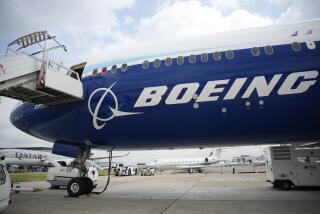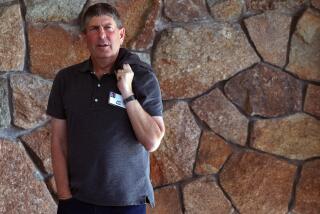Mission Completed : Rockwell CEO, Who Led Firm’s Metamorphosis, to Step Down
- Share via
Having completed one of the most dramatic and high-profile corporate restructurings in the aerospace industry, Donald R. Beall on Wednesday made the surprise announcement that he will step down as chairman and chief executive of Rockwell International on Sept. 30. He will be succeeded by Don H. Davis, who has been Rockwell’s president and chief operating officer since 1995.
Over the last decade, Beall has transformed Seal Beach-based Rockwell from a wide-ranging aerospace and defense conglomerate that collected 64 cents of every dollar in revenue from the U.S. government into a commercial firm focused on the fast-growing electronics industry.
Several of its one-time aerospace brethren have joined Rockwell in mining opportunities in commercial electronics as declining federal spending caused a major contraction in the defense industry. But Beall began charting such a course for Rockwell starting in the late 1980s, well ahead of his competition.
“The transformation and restructuring of Rockwell over the last many years is essentially complete,” Beall said in an interview after attending the company’s board meeting in Milwaukee. “I’m proud to have played the part I did to get us to this point.”
Beall, whose extracurricular activities include positions with the Los Angeles World Affairs Council and the Business Roundtable’s policy committee, said he will focus on “education, family business activities and some entrepreneurial things I’ve been doing.” He declined to elaborate.
Although Beall revealed Wednesday that he has been discussing such a move with Rockwell’s board over the last few years, analysts and even company insiders were surprised that he decided to step down at the relatively young age of 58.
Analysts uniformly praised Beall for his stewardship of Rockwell--which played a major role in the space shuttle and
B-1 bomber programs--during the rocky years of defense industry downsizing in the early 1990s.
“When he took it over, it was largely a conglomerate in an era when that was fashionable,” said Robert Paulson, chief executive of Aerostar Capital, an investment company in Wilson, Wyo., and the former head of McKinsey & Co.’s aerospace practice in Los Angeles. “It was Don who took the healthy businesses and began to build something. He completed the transition from an aerospace company to an electronics company. Most aerospace companies don’t accomplish that.”
Wall Street also praised the selection of heir apparent Davis, who will become chief executive on Oct. 1 and chairman of the company in February 1998.
“Mr. Davis has got an engineering background, he’s been in sales, he’s been in management and he looks like a good candidate to be CEO. I’m very happy about that,” said Patrick Dunkerley, vice president for research at the Securities Corp. of Iowa in Cedar Rapids.
Despite analysts’ praise for both Beall and Davis, Rockwell’s shares fell 44 cents to close at $57.56 in New York Stock Exchange trading, the lowest price so far in 1997. The stock has fallen 19% from a peak of $70.50 in February, a decline analysts attribute to worries about heated competition in the market for the semiconductors used in modems.
In an interview, Davis said that there will not be “any great big revelations” when he takes over, and that he will concentrate on business opportunities in Asia, Latin America and Europe.
Ten years ago, Rockwell was diversified in the aerospace, electronics, graphics and automotive businesses. Today, after strategic divestments and acquisitions, the company’s three main units are automation, with projected 1997 sales of $4.5 billion; avionics and communications, with $1.7 billion in expected 1997 sales; and semiconductor systems, which is expected to bring in $1.8 billion this year.
Beall said he played a major role in three key decisions that put Rockwell on its current course: the $115.7-million purchase in 1973 of Collins Radio, the basis for today’s electronics business; the $1.6-billion acquisition of factory automation equipment maker Allen-Bradley in 1985; and the identification of electronics for communications and semiconductors as a new focus for the company.
By the time Rockwell sold its remaining aerospace and defense businesses to Boeing Co. for $3.2 billion in December 1996, it accounted for only 25% of the company’s revenue, Beall said. Today, about 6% of the firm’s revenue is from government contracts. The final move in the restructuring was the decision in March to spin off the firm’s automotive holdings into a separate $3.1-billion public company.
“Don Beall’s history in the company has been a phenomenal one, and Wall Street will miss him, more than a little bit,” said Joseph F. Campbell Jr., an aerospace analyst with Lehman Bros. in New York. “He took a company that was predominantly in aerospace . . . and completely restructured the business. Everything he did made a significant change in the way the company performed and was received.
But Beall’s decision to step down now--and to give only three months’ notice--led some people to speculate that Beall or one of his family members was suffering from a health problem. A Rockwell spokesman denied that.
One analyst with close ties to many Rockwell insiders said that “not one of them saw it coming, and not one of them knew why” Beall decided to step down.
Paul Nisbet, president of JSA Research, an aerospace research firm in Newport, R.I., said he thought Beall would make one more deal before stepping down, possibly acquiring a semiconductor firm.
Jack Blackstock, conglomerate analyst at Donaldson, Lufkin & Jenrette in New York, said the timing of Beall’s departure would be right if Rockwell is preparing to embark on a series of new acquisitions, which the company is in a position to do.
“It’s like driving across the desert and seeing a sign that says, ‘Next gas 120 miles,’ ” he said.
During his 18-year tenure as president, chief executive and chairman of Rockwell, Beall dedicated many hours to community and civic pursuits.
“He was a very substantial presence, particularly in the Orange County business area,” Paulson said. “He’s helped pull together Orange County as a separate and viable business community. After [Northrop Grumman Chairman] Kent Kressa, he’s probably the highest-profile aerospace executive of the modern era in Southern California.”
Beall has received awards from UCLA’s John E. Anderson School of Management, the Navy League, the Orange County Council of the Boy Scouts of America, the California Manufacturers Assn. and the National Management Assn.
On the personal side, Beall and his wife, Joan, have been strong supporters of the performing arts, particularly in Orange County. The couple has two children.
Beall serves on the board of directors of Procter & Gamble, Amoco Corp. and Times Mirror Co., the parent company of the Los Angeles Times. He also serves on the boards of UC Irvine and the Hoover Institution at Stanford University and is a trustee at Caltech.
* SUCCESSOR’S SIMILARITIES
Employees and investors may find more similarities than differences in Beall’s successor, Don H. Davis. D10
(BEGIN TEXT OF INFOBOX / INFOGRAPHIC)
Rockwell Under Beall
Since he became chief executive nine years ago, Donald R. Beall has transformed Rockwell International Corp. from an aerospace giant into a technology company considered a leader in electronics, automation systems and vehicle parts. Here’s how the company looked in 1988 and how it looks now:
From a Past Rooted in Aerospace ...
Aerospace led 1988 revenue at Rockwell, which was renowned for its work on the space shuttle and the B-1 bomber.
Aerospace: 35%
Automotive components: 18%
Divested electronics: 14%
Avionics: 11%
Automation: 10%
Graphics: 7%
Semiconductor systems: 3%
Rockwell’s electronics divisions account for an increasing portion of the company’s sales, jumping from 38% in 1988 to 70% last year:
Avionics: 14%
Automation: 40%
Automotive components: 30%
Semiconductor systems: 16%
Some highlights of Beall’s tenure as president and chief executive at the Seal Beach-based firm:
* Engineered the $3.1-billion sale of Rockwell’s defense aerospace business to Boeing Co. in December 1996.
* Acquired about 30 businesses for $4 billion, including industrial automation equipment maker Reliance Electric, purchased in 1995 for $1.6 billion.
* Divested businesses that generated $2 billion in resources, slashed the company’s work force from 106,000 in 1984 to 44,000 in 1997 and reduced its reliance on government contracts from 63% in 1984 to 6% last year.
* Built Rockwell’s industrial automation business with the help of Don H. Davis.
* Helped persuade Rockwell executives to buy the Allen-Bradley automation company in 1985, which he expanded and focused on microelectronics.
Note: Numbers do not total 100% due to rounding.
Sources: Bloomberg News, company reports, Times and wire reports
Researched by JENNIFER OLDHAM/Los Angeles Times
More to Read
Inside the business of entertainment
The Wide Shot brings you news, analysis and insights on everything from streaming wars to production — and what it all means for the future.
You may occasionally receive promotional content from the Los Angeles Times.











